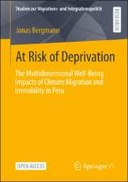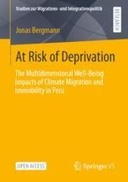Explore

This open access book examines how and why various forms of climate (im)mobilities can impact people's objective and subjective well-being. Worsening climate impacts are forcing subsistence farmers worldwide to decide between staying or leaving their homes. This mixed methods study analyzes cases of climate-related migration, displacement, relocation, and immobility in Peru's coastal, highland, and rainforest regions. The results reveal that numerous farmers experienced profound and often negative well-being impacts, regardless of whether they stayed or migrated. The higher the structural constraints, such as weak governance, and the more damaging the climate impacts were, the higher the risk of well-being declines. Additionally, the affected individuals often had limited agency and ability to mitigate losses. These findings challenge the notion of "migration as adaptation" and emphasize the importance of safeguarding the human rights and security of those affected while addressing loss and damage. Without significant investments in such efforts, climate impacts could sharply diminish the well-being of numerous subsistence farmers worldwide—irrespective of whether they stay or migrate.
This book is included in DOAB.
Why read this book? Have your say.
You must be logged in to comment.
Rights Information
Are you the author or publisher of this work? If so, you can claim it as yours by registering as an Unglue.it rights holder.Downloads
This work has been downloaded 114 times via unglue.it ebook links.
- 35 - epub (None) at Unglue.it.
- 28 - pdf (None) at Unglue.it.
Keywords
- Biology, Life Sciences
- Climate Change
- displacement
- Ecological science, the Biosphere
- Geography
- Immobility
- Life sciences: general issues
- Mathematics & science
- migration
- Peru
- Physical geography & topography
- relocation
- thema EDItEUR::P Mathematics and Science::PS Biology, life sciences::PSA Life sciences: general issues::PSAF Ecological science, the Biosphere
- Well-being
Links
DOI: 10.1007/978-3-658-42298-1web: https://link.springer.com/book/10.1007/978-3-658-42298-1
Editions



